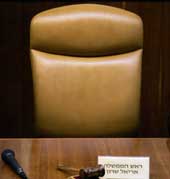 |
| The empty chair and gavel of Sharon at the cabinet meeting on Sunday. (AFP) |
Jerusalem, Jan. 8 (Reuters): Doctors plan to begin rousing Israeli Prime Minister Ariel Sharon from a medically induced coma tomorrow and start assessing damage caused by a massive stroke, a hospital spokesman said today.
A new scan of Sharon’s brain showed improvement, with swelling down and pressure in his skull normal, although the 77-year-old leader remained in critical but stable condition, said Dr Shlomo Mor-Yosef, director of Hadassah hospital.
“As a result of all these indicators, the team of experts has decided to start the pro- cess of reducing the Prime Minister’s sedation tomorrow morning, on condition there are no significant events between now and the morning,” he said.
“This is what we have all been waiting for since Wednesday ? to see how his brain is functioning.”
Surgeons at the hospital, where Sharon has been under sedation and on a respirator since Wednesday’s stroke, have said there is a good chance he will survive although it is unclear how much his faculties have been impaired.
The medical consensus was that even if he survived, Sharon ? for many, Israel’s most dominant figure since founding Prime Minister David Ben-Gurion ? was unlikely to return to politics.
The death or incapacity of Sharon, who raised peace hopes by pulling Israeli settlers and troops out of Gaza in September to end 38 years of military rule, would create a void in Israeli politics and efforts to forge peace with the Palestinians.
Acting Prime Minister Ehud Olmert, also Israel’s finance minister, projected a message of business at the weekly cabinet meeting and at a separate news conference in which he promised continued economic stability.
Sitting next to Sharon’s vacant chair at the cabinet table, Olmert pledged to “run matters as he would have wished”.
Speaking later to reporters, Olmert said: “I pray with all the people of Israel that my tenure as the acting Prime Minister will be short.”
Hadassah neurosurgeon Jose Cohen said yesterday, a day after Sharon underwent surgery to staunch renewed bleeding in his brain, that the Israeli leader’s chances of survival were “very high”.
But Cohen stressed that Sharon would not be unscathed: “To say that after a severe impact like this one there would not be cognitive problems is just not acknowledging reality.”










